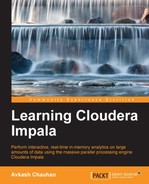An operator is a symbol specifying an action that is performed on one or more expressions. Operators are used with multiple statements in SQL. There are various kinds of operators in SQL. They are as follows:
- Arithmetic operators
- Logical operators
- The assignment operator
- Scope-resolution operators
- Bitwise operators
- Set operators
- Comparison operators
- The string-concatenation operator
- Compound operators
- Unary operators
Explaining each kind of operator is out of our scope here, so we will discuss a few commonly used operators in Impala as follows.
- BETWEEN: The
BETWEENoperator is used with theWHEREclause, and this operator compares the values between the lower and upper bound given with theWHEREclause. The comparison is successful if the expression is greater than or equal to the lower bound and less than or equal to the upper bound. If the bound values are switched, the lower bound is greater than the upper bound; theBETWEENoperator does not match any values as a result. The syntax to use theBETWEENoperator with theWHEREclause is as follows:expression BETWEEN lower_bound AND upper_bound Example: SELECT column_name FROM table_name WHERE value_in_column BETWEEN lower_bound AND upper_bound;
Here are a few key things to remember when using the
BETWEENoperator in Impala:The
BETWEENoperator works with any kind of data type; however, it is not practical to use it withBOOLEANSometimes it is possible that the values provided are in the lower or upper bound, so you can apply the
Cast()operator to those values to convert them into compatible typesIt is also important to note that the
BETWEENoperator is typically used with numeric data types, so other functions can also be used to extract numeric values, if possible.While using
BETWEENwith a string, it is advisable to use theupper(),lower(),substr(), ortrim()function to operate on the string instead of having them operated with theBETWEENoperator, because variation in the string length could change the outcome of the comparison operator inBETWEEN. - DISTINCT: The SQL
DISTINCToperator is used with theSELECTstatement to retrieve only unique data entries, depending on the column list selected in the table. Here are the key features of theDISTINCToperator when used with Impala:- The
DISTINCToperator returns the unique values from the column NULLis also included as a value in the column and as part of the result- The
DISTINCToperator can also return unique combinations of values from multiple columns within the sameSELECTstatement - The
DISTINCToperator can be combined with other functions, such asCOUNT, to aggregate total unique values found in the reference column - Impala does not support using
DISTINCTin more than one aggregate function in the same query
Here is the syntax and an example of using the
DISTINCToperator in Impala:SELECT DISTINCT column_name FROM table_name; SELECT DISTINCT column_name1, column_name2 FROM table_name; SELECT COUNT(DISTINCT column_name) FROM table_name; SELECT SUM(DISTINCT column_name) FROM table_name; SELECT SUM(DISTINCT column_name) FROM table_name WHERE (column_name CONDITION value);
- The
- LIKE: Sometimes performing wildcard-based comparisons with
STRINGdata is required, and for this requirement theLIKEoperator is used. In Impala, theLIKEoperator is used as a comparison operator to match theSTRINGtype of data. For a single character match,LIKEuses_(underscore) and for multiple characters, the%(percentage) sign is used. Using the%wildcard at the end of the string to get efficient results is suggested.The following is the syntax of using the
LIKEoperator in Impala:SELECT column_name FROM table_name WHERE column_name LIKE '%'; SELECT column_name from table_name WHERE column_name LIKE '_'; SELECT column_name from table_name WHERE column_name LIKE '_' OR column_name LIKE '%';
Now, let's see a few examples of using the
LIKEoperator in Impala. The following statement will return all the state names, which are only two characters and start with the letterC:SELECT DISTINCT(state_names) from us_state_list WHERE state_name LIKE 'C_';
The following statement will return all the names that start with
Joand can be two or more characters long. In this Impala statement, the result will include John, Joe, Jo, and Johnson.SELECT DISTINCT(names) from names_list WHERE names LIKE 'Jo%';
